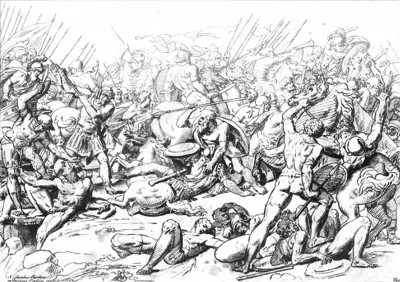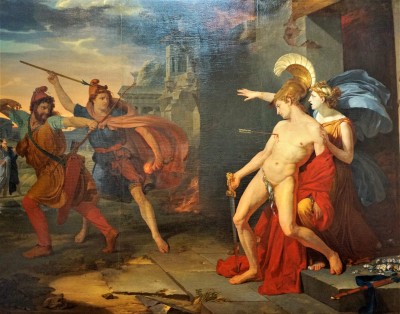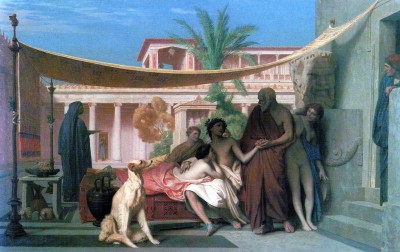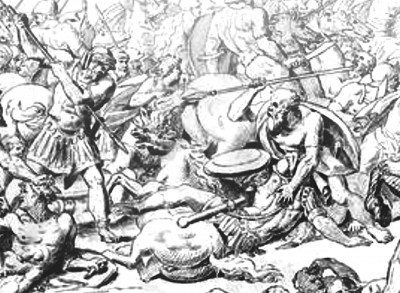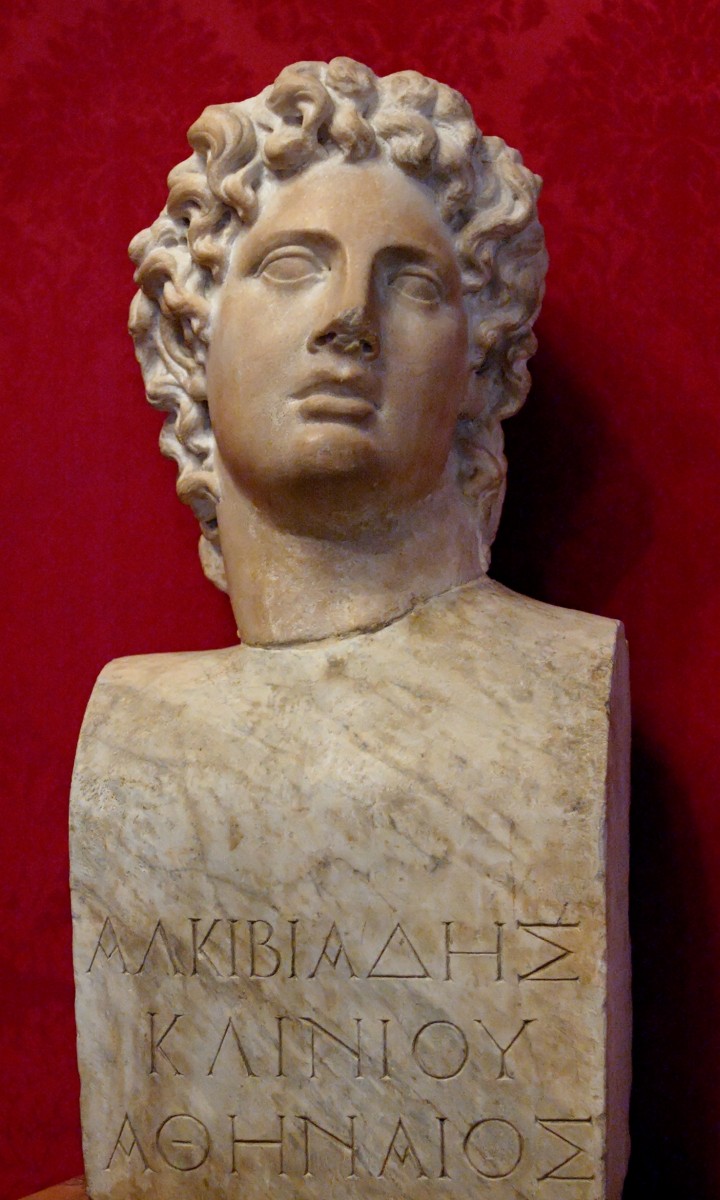Alkibiadés
Alcibiades
Alcibiades was born in 450 BC into a wealthy Athenian aristocratic family. His mother, Deinomachos, was the daughter of Megaclea, head of the influential Alcmaeon family. After his father Cleinias was killed at the Battle of Corneille, his uncle Pericles became Alcibiades' guardian.
Young Alcibiades' teacher and friend was the famous philosopher Socrates. However, neither Socrates nor Pericles was very successful in his education. Alcibiades was an intelligent man, perhaps the best Athenian strategist of the Peloponnesian War, but he was also famous for his wild life of drinking, rioting and love affairs. His wife Hipparetta even petitioned the archon for a divorce.
He switched sides several times during the Peloponnesian War. He fought for Athens, advised Sparta and schemed in Persia. In his defense, however, he had many sworn enemies and was often forced to defect to the enemy by the intrigues of his opponents.
In 431 BC, the second phase of the Peloponnesian War, the so-called Archidamus War (431 BC - 421 BC), began. The Athenian army besieged the city of Poteidaiu in Chalkidiki. In the fighting at Poteidaia, Alcibiades was wounded and owes his life to Socrates. Conversely, in 424 BC, when the Athenian army was defeated by the Thebans and the Boeotians at Delius, Alcibiades again saved the life of Socrates.
Alcibiades was one of the hardliners against Sparta and did not agree to the peace agreement of 421 BC, the so-called Peace of Nicias - after the Athenian politician and military leader Nicias. Nikias became his arch-enemy. On Alcibiades' initiative, Athens supported the anti-Spartan coalition of Argos and Mantinea, but in 418 BC the Spartans defeated the coalition at the Battle of Mantinea.
A year later, the animosity between Alcibiades and Nicias reached a peak, and their dispute was to be adjudicated by the Court of Shrapnel. Hyperbolos wanted to use the dispute between Nicias and Alcibiades to his advantage. The two rivals temporarily broke off hostilities, united against Hyperbolos, and Hyperbolos himself was eventually ostracized. It was the last shard trial ever. Hyperbolos was eventually deemed so insignificant that the verdict was overturned and Hyperbolos did not have to go into exile.
In 416 BC, Alcibiades commanded an Athenian expedition against Argos. Argos was forced to confirm his alliance with Athens. An envoy from Sicily arrived in Athens at that time. The cities of Segesta and Leontini asked Athens for help against Syracuse. The cautious Nicias opposed military intervention. Eventually, however, the party led by Alcibiades, who wanted to extend Athenian power into the western Mediterranean, gained the upper hand. Alcibiades was elected one of the three strategists and in 415 BC the largest invasion army ever assembled set sail from Athens.
Before setting sail, Alcibiades committed another drunken outrage. The charges were serious, the indictment accusing him of destroying sacred statues, herms, and defacing the Eleusinian mysteries and the festivals of the goddess Demeter. The trial was suspended, and Alcibiades was able to sail. Before landing at Syracuse, a message arrived to summon him to court. Alcibiades was informed by his supporters that some of his co-accused of blasphemy had been sentenced to death, and, indignant, he abandoned the military expedition and took refuge in Sparta. In Athens he was condemned to death in absentia, cursed and deprived of his property.
Between 415 BC and 412 BC, Alcibiades resided in Sparta. He informed the Spartans of Athenian intentions for permanent expansion into Sicily, southern Italy and northern Africa. Sparta sent a military contingent led by the brilliant strategist Gylippus to aid Syracuse. The Athenian campaign against Syracuse ends in disastrous defeat in 413 BC. Alcibiades' next recommendation also has fatal consequences for Athens. On Alcibiades' advice, the Spartans occupy the mountain village of Dekeleia in northern Attica and station a garrison there, which makes devastating raids into the Athenian interior. Athens is cut off from the Laurian silver mines.
Defeat in Sicily and Alcibiades' diplomacy (Alcibiades personally negotiates at Chios) leads to the withdrawal of some strategic cities from the Attica-Delaysia alliance in 412 BC. Athens' supply via the Hellespont is threatened.
However, the situation quickly changes. Alcibiades has a love affair with the wife of the Spartan king Aegis II, Timaeus, and is said to be the father of her son, Leotychides. Agis' brother Agesilaos thus becomes the future king of Sparta instead of Leotychides. Alcibiades has to flee to Persia to Tissaphernes, the satrap of Sardes, and begins to negotiate with Athens about the possibility of his return. From June 411 BC, a council of four hundred rules Athens after an oligarchic coup. According to Alcibiades, the removal of the Athenian democracy is to be one of the conditions of Persian aid. But the attempt to get Persia on the side of Athens is doomed to failure. Athens had supported the rebels in Caria in 414 BC, and the Persian king Darius II sided with Sparta. Tissaphernes is ordered to arrest Alcibiades, but the latter manages to escape and, in order to take revenge on Tissaphernes, spreads the rumour that Tissaphernes has let him go free. The Sardinian satrap falls into disfavour with Darius II.
Alcibiades sails to Samos. The Athenian fleet, which was anchored there, refused to recognize the legitimacy of the Council of the Four Hundred and called him to its head. Alcibiades now calls for democracy and calls for the establishment of a government of five thousand. Between 411 BC and 410 BC, Alcibiades proves his ability and defeats the Spartan fleet twice. In a decisive battle in May 410 BC at Kyzicus in the Propontis (Sea of Marmara), the commander of the Spartan fleet Mindaros also falls. In 409 BC, Alcibiades fortifies Lampsakos on the Asiatic shore of the Hellespont. In 408 BC he also gains control of Byzantium and returns triumphantly to Athens.
Alcibiades is hailed as a national hero. He is fully rehabilitated and elected as a leader without limited powers (hegemon autokrator). Alcibiades' fate is full of twists and turns. In 407 BC, in his absence, the Athenian fleet is defeated at the Battle of Notia (at Ephesus). The blame is laid on Alcibiades, who again leaves Athens and spends three years at Chersonese in Thrace.
In 405 BC, the Spartan Lysandros conquers Lampsakos and again threatens the supply of Athens. Athens sends a massive fleet to Lampsacus. The commanding strategists reject Alcibiades' advice, are outnumbered and confident of victory. Lysandros surprises the Athenian fleet opposite Lampsacus at Aigospotamoi and destroys it. It is a decisive defeat in the Peloponnesian War. In the spring of 404 BC. Athens capitulates.
Alcibiades flees to Phrygia to the satrap Pharnabazus. But his destiny is fulfilled. Assassins, probably hired by Lysander, set fire to the house where Alcibiades is sleeping, and when he tries to escape, he is hit by their arrows.
Bitva u Potideje. Athéňané proti Korinťanům, 432 př. n. l.; Sokrates zachraňuje Alkibiada
commons.wikimedia.org
V roce 404 př. n. l. byl Alkibiadés, vyhnaný v achaimenovské říši v provincii Hellespontská Frýgie, zavražděn perskými vojáky, kteří možná plnili rozkazy satrapy Farnabaze II. na popud Sparty.
commons.wikimedia.org
Bitva u Potideje (432 př. n. l.): Athéňané proti Korinťanům (detail). Scéna, v níž Sokrates zachraňuje Alkibiada.
commons.wikimedia.org
Idealizovaný mužský portrét, tradičně označovaný jako Alkibiadův. Římská kopie řeckého originálu z období druhého klasicismu. Hermovský sloup a nápis ("Alkibiades, syn Kleiniův, Athéňan") jsou novodobé doplňky.
commons.wikimedia.org
Young Alcibiades' teacher and friend was the famous philosopher Socrates. However, neither Socrates nor Pericles was very successful in his education. Alcibiades was an intelligent man, perhaps the best Athenian strategist of the Peloponnesian War, but he was also famous for his wild life of drinking, rioting and love affairs. His wife Hipparetta even petitioned the archon for a divorce.
He switched sides several times during the Peloponnesian War. He fought for Athens, advised Sparta and schemed in Persia. In his defense, however, he had many sworn enemies and was often forced to defect to the enemy by the intrigues of his opponents.
In 431 BC, the second phase of the Peloponnesian War, the so-called Archidamus War (431 BC - 421 BC), began. The Athenian army besieged the city of Poteidaiu in Chalkidiki. In the fighting at Poteidaia, Alcibiades was wounded and owes his life to Socrates. Conversely, in 424 BC, when the Athenian army was defeated by the Thebans and the Boeotians at Delius, Alcibiades again saved the life of Socrates.
Alcibiades was one of the hardliners against Sparta and did not agree to the peace agreement of 421 BC, the so-called Peace of Nicias - after the Athenian politician and military leader Nicias. Nikias became his arch-enemy. On Alcibiades' initiative, Athens supported the anti-Spartan coalition of Argos and Mantinea, but in 418 BC the Spartans defeated the coalition at the Battle of Mantinea.
A year later, the animosity between Alcibiades and Nicias reached a peak, and their dispute was to be adjudicated by the Court of Shrapnel. Hyperbolos wanted to use the dispute between Nicias and Alcibiades to his advantage. The two rivals temporarily broke off hostilities, united against Hyperbolos, and Hyperbolos himself was eventually ostracized. It was the last shard trial ever. Hyperbolos was eventually deemed so insignificant that the verdict was overturned and Hyperbolos did not have to go into exile.
In 416 BC, Alcibiades commanded an Athenian expedition against Argos. Argos was forced to confirm his alliance with Athens. An envoy from Sicily arrived in Athens at that time. The cities of Segesta and Leontini asked Athens for help against Syracuse. The cautious Nicias opposed military intervention. Eventually, however, the party led by Alcibiades, who wanted to extend Athenian power into the western Mediterranean, gained the upper hand. Alcibiades was elected one of the three strategists and in 415 BC the largest invasion army ever assembled set sail from Athens.
Before setting sail, Alcibiades committed another drunken outrage. The charges were serious, the indictment accusing him of destroying sacred statues, herms, and defacing the Eleusinian mysteries and the festivals of the goddess Demeter. The trial was suspended, and Alcibiades was able to sail. Before landing at Syracuse, a message arrived to summon him to court. Alcibiades was informed by his supporters that some of his co-accused of blasphemy had been sentenced to death, and, indignant, he abandoned the military expedition and took refuge in Sparta. In Athens he was condemned to death in absentia, cursed and deprived of his property.
Between 415 BC and 412 BC, Alcibiades resided in Sparta. He informed the Spartans of Athenian intentions for permanent expansion into Sicily, southern Italy and northern Africa. Sparta sent a military contingent led by the brilliant strategist Gylippus to aid Syracuse. The Athenian campaign against Syracuse ends in disastrous defeat in 413 BC. Alcibiades' next recommendation also has fatal consequences for Athens. On Alcibiades' advice, the Spartans occupy the mountain village of Dekeleia in northern Attica and station a garrison there, which makes devastating raids into the Athenian interior. Athens is cut off from the Laurian silver mines.
Defeat in Sicily and Alcibiades' diplomacy (Alcibiades personally negotiates at Chios) leads to the withdrawal of some strategic cities from the Attica-Delaysia alliance in 412 BC. Athens' supply via the Hellespont is threatened.
However, the situation quickly changes. Alcibiades has a love affair with the wife of the Spartan king Aegis II, Timaeus, and is said to be the father of her son, Leotychides. Agis' brother Agesilaos thus becomes the future king of Sparta instead of Leotychides. Alcibiades has to flee to Persia to Tissaphernes, the satrap of Sardes, and begins to negotiate with Athens about the possibility of his return. From June 411 BC, a council of four hundred rules Athens after an oligarchic coup. According to Alcibiades, the removal of the Athenian democracy is to be one of the conditions of Persian aid. But the attempt to get Persia on the side of Athens is doomed to failure. Athens had supported the rebels in Caria in 414 BC, and the Persian king Darius II sided with Sparta. Tissaphernes is ordered to arrest Alcibiades, but the latter manages to escape and, in order to take revenge on Tissaphernes, spreads the rumour that Tissaphernes has let him go free. The Sardinian satrap falls into disfavour with Darius II.
Alcibiades sails to Samos. The Athenian fleet, which was anchored there, refused to recognize the legitimacy of the Council of the Four Hundred and called him to its head. Alcibiades now calls for democracy and calls for the establishment of a government of five thousand. Between 411 BC and 410 BC, Alcibiades proves his ability and defeats the Spartan fleet twice. In a decisive battle in May 410 BC at Kyzicus in the Propontis (Sea of Marmara), the commander of the Spartan fleet Mindaros also falls. In 409 BC, Alcibiades fortifies Lampsakos on the Asiatic shore of the Hellespont. In 408 BC he also gains control of Byzantium and returns triumphantly to Athens.
Alcibiades is hailed as a national hero. He is fully rehabilitated and elected as a leader without limited powers (hegemon autokrator). Alcibiades' fate is full of twists and turns. In 407 BC, in his absence, the Athenian fleet is defeated at the Battle of Notia (at Ephesus). The blame is laid on Alcibiades, who again leaves Athens and spends three years at Chersonese in Thrace.
In 405 BC, the Spartan Lysandros conquers Lampsakos and again threatens the supply of Athens. Athens sends a massive fleet to Lampsacus. The commanding strategists reject Alcibiades' advice, are outnumbered and confident of victory. Lysandros surprises the Athenian fleet opposite Lampsacus at Aigospotamoi and destroys it. It is a decisive defeat in the Peloponnesian War. In the spring of 404 BC. Athens capitulates.
Alcibiades flees to Phrygia to the satrap Pharnabazus. But his destiny is fulfilled. Assassins, probably hired by Lysander, set fire to the house where Alcibiades is sleeping, and when he tries to escape, he is hit by their arrows.
Bitva u Potideje. Athéňané proti Korinťanům, 432 př. n. l.; Sokrates zachraňuje Alkibiada
commons.wikimedia.org
V roce 404 př. n. l. byl Alkibiadés, vyhnaný v achaimenovské říši v provincii Hellespontská Frýgie, zavražděn perskými vojáky, kteří možná plnili rozkazy satrapy Farnabaze II. na popud Sparty.
commons.wikimedia.org
Bitva u Potideje (432 př. n. l.): Athéňané proti Korinťanům (detail). Scéna, v níž Sokrates zachraňuje Alkibiada.
commons.wikimedia.org
Idealizovaný mužský portrét, tradičně označovaný jako Alkibiadův. Římská kopie řeckého originálu z období druhého klasicismu. Hermovský sloup a nápis ("Alkibiades, syn Kleiniův, Athéňan") jsou novodobé doplňky.
commons.wikimedia.org
Reklama
Join us
We believe that there are people with different interests and experiences who could contribute their knowledge and ideas. If you love military history and have experience in historical research, writing articles, editing text, moderating, creating images, graphics or videos, or simply have a desire to contribute to our unique system, you can join us and help us create content that will be interesting and beneficial to other readers.
Find out more